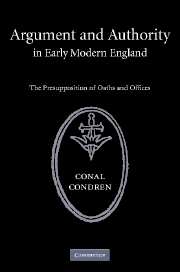Book contents
- Frontmatter
- Contents
- Preface
- Introduction
- Part I The liquid empire of office
- Part II The authority and insolence of office
- Part III ‘I, A. B.’
- 11 An overview of the oath in seventeenth-century argument
- 12 Coronation oaths
- 13 The oath of allegiance of 1606
- 14 Engagement with a free state
- 15 The oath of allegiance and the Revolution of 1688–9
- Epilogue
- Bibliography
- Index
11 - An overview of the oath in seventeenth-century argument
from Part III - ‘I, A. B.’
Published online by Cambridge University Press: 28 October 2009
- Frontmatter
- Contents
- Preface
- Introduction
- Part I The liquid empire of office
- Part II The authority and insolence of office
- Part III ‘I, A. B.’
- 11 An overview of the oath in seventeenth-century argument
- 12 Coronation oaths
- 13 The oath of allegiance of 1606
- 14 Engagement with a free state
- 15 The oath of allegiance and the Revolution of 1688–9
- Epilogue
- Bibliography
- Index
Summary
Now Oaths are so frequent, they should be taken like Pills, swallowed whole; if you chew them you will find them bitter; if you think what you swear,'twill hardly go down.
(Selden, Table Talk, 1686, para. 94)The ancient and sacrosanct practice of oath-taking epitomised office in action, and like the term office, the English ‘oath’ was one of a whole family of quasi-synonyms and potentially casuistic qualifiers, such as protest, vow, promise, confess, affirm, declare, believe and know, incitements all to controversy. A vow, for example, could be a promise to God, an oath called upon Him as a witness, but sometimes the words could be interchangeable. In Twelfth Night, Sir Toby Belch tells Viola that Sir Andrew Aguecheek will fight only ‘for's oath sake’, referring to this as ‘his vow’. The vow of a nun taking holy orders is included in The Booke of Oathes. At the end of the century, while Roger Palmer called oaths and vows synonyms, White Kennett insisted they were different.
Other terms in the ambit of swearing, such as protest, or declare, could seem less onerous than the specific oath. Their presence in oath-like documents is partially explained by a common distinction made between assertory and promissory oaths. The assertory oath was in Austinian terms a constative: it attested to a state of affairs, such as one's identity in a court of law. The promissory, however, was an Austinian performative; like a wager, it was a creative act, having ‘constructive power’.
- Type
- Chapter
- Information
- Argument and Authority in Early Modern EnglandThe Presupposition of Oaths and Offices, pp. 233 - 253Publisher: Cambridge University PressPrint publication year: 2006
- 1
- Cited by

